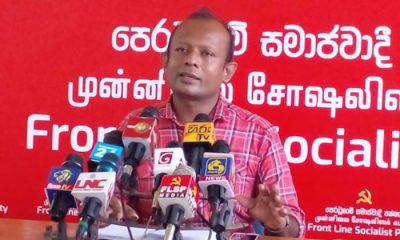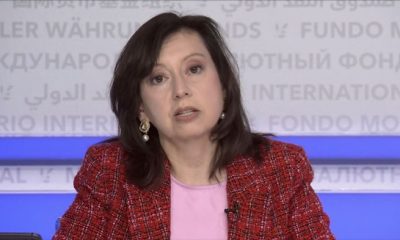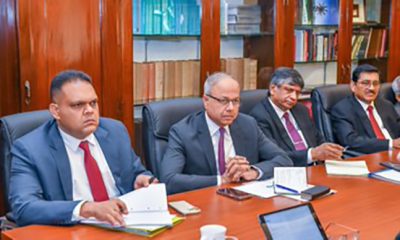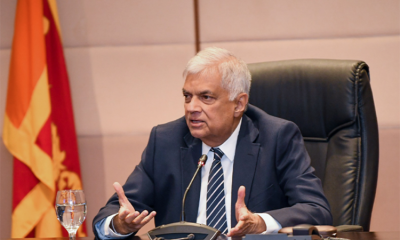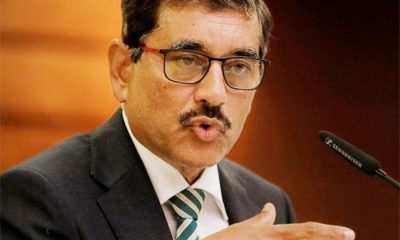News
CB Governor says he preferred to avoid domestic debt restructuring
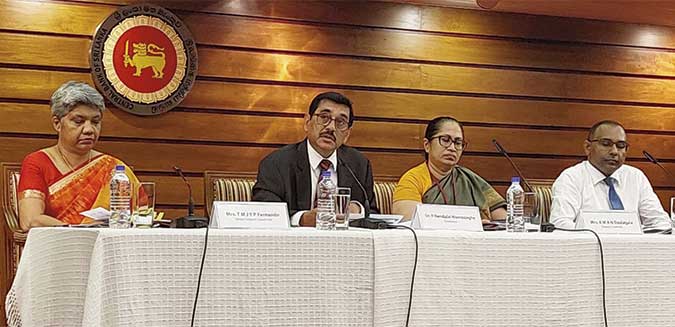
By Rathindra Kuruwita
Ghas said that it was still his position that it is better if Sri Lanka could avoid restructuring its domestic debt.Dr. Weerasinghe, addressing the media, at the Central Bank on Thursday, said that the CBSL position was that because of high inflation, the country’s domestic debt had undergone restructuring in a way.
“At that time, we felt that there was no need to restructure domestic debt because that had already happened as a result of inflation. I still say it is better if we can avoid restructuring our domestic debt because it is already restructured.” He said that position had been changed due to the ongoing negotiation process,” he said.
Once the President of Sri Lanka reached a staff-level agreement with the IMF, the country was committed to sovereign debt sustainability. The country has agreed to certain debt targets for the next 10 years.
“When we ask our external creditors to make a significant contribution and take a cut, the external creditors want some more contributions from domestic lenders. This is a process of negotiations. There are two choices: you can hold on to a position and get nothing done, or compromise and get things done. We compromised while protecting the interests of the Central Bank,” he said.
Market interest rates have already declined in response to measures already taken to ease monetary conditions, Dr. Weerasinghe said.The interest rates on Treasury bonds issued by Sri Lanka were high in the past few years, but the rates have been coming down. The rates were high because of the uncertainty in the country.
“Last week, the interest rates of Treasury bonds touched the policy rates, just below 14 percent. As we have always said, the uncertain premium would collapse if there was stability and clarity about domestic debt restructuring,” he said.
When questioned by a journalist why the CBSL had sold Treasury bills on Thursday (06) worth over 130 billion rupees well above the policy rate, the Governor said that it had been a weekly bond auction to meet government expenditure requirements.
“We can’t decide on government cash flow operations and delay cash flows, anticipating policies to take effect. This amounts to market manipulation. If the government wants, it can ask us not to raise funds right now. Can the government wait, expecting interest rates to go down?” he said.
Dr. Weerasinghe said that in the future, the interest rate structure would return to normal with benchmark rates moving closer to policy rates.
“We hope that the rates will normalise so the economy will benefit. We will not hesitate to take on more administrative tasks to make sure this happens,” he said.
The Governor said that financial institutions had brought down interest rates on credit cards by 2 percent.
“We want to see rates for lending, especially for Small and Medium enterprises, lower faster,” he said.
The Governor said that with the drop in interest rates of Treasury bills, EPF would have to look at alternative investments. The EPF was able to make significant investments because there was a lot of demand for funds from the government, he said.
“Going forward, medium and long term investments strategies have to change for such funds,” he said.
The Governor also dismissed allegations that the EPF would lose 12 trillion rupees by 2038 as the government had decided, in the domestic debt restructuring proposals, only to pay an interest rate of nine percent instead of the average market rate for Treasury bills, which is 13.5 percent.
“Those assessments misrepresent the facts, figures, and reality. The argument is that the average interest payment for Treasury bills is 13.5 percent. I don’t know how that number even came up. However, EPF’s average yield on their medium and long-term fund is 11.5 percent. That’s why EPF paid nine percent interest to its beneficiaries,” he said.
Those who claim the EPF will lose 12 trillion rupees by 2038 assume that 13.5 percent interest can be made from investing Treasury bonds until then, he said.
“The inflation must be around 15–18 percent until 2038 to ensure a 13.5 percent interest rate for Treasury bonds. So, obviously, these are manipulated numbers. The assumption is that our debt will not be sustainable,” Dr. Weerasinghe said.
The Governor said that the Central Bank was responsible for the stability of the financial system, the Central Bank balance sheet, and being the custodian of the EPF.Dr. Weerasinghe said that the markets and international rating agencies had responded positively to domestic debt restructuring.
“We have finalised domestic debt restructuring, and this is important when it comes to dealing with foreign creditors. We are also having discussions with them. The discussions with the Paris Club are on. We have shared data analysis and proposals. We are making progress on the bilateral discussions with non-Paris Club countries like China. Discussions with Chinese banks are ongoing. When it comes to ISB holders, we had several rounds of discussions. Our advisor, Lazard, is conducting discussions with them. We hope that this process will make progress. We would like to expedite the process and reach agreements with both bilateral and ISB creditors before the first IMF review. This is our first objective,” he said.
The IMF, ADB and World Bank have approved another 900 million dollars in the near future, he said.
The Governor added that imports had stabilised at around 1.4 billion dollars a month. Exports stand at around 1 billion dollars. There is a gap of about 400 million dollars between the two.
“We can fill the gap with our worker remittances and tourism. There can be a balance. Even if imports go up to 1.6 or 1.7 billion dollars, we have a buffer,” he said.
Sri Lanka has already met the reserve levels agreed with the IMF. This will give investors more confidence and strengthen their ability to intervene in the market.
“All targets, except revenue targets, have been met. That’s because import tax collection was low due to lower imports. This is why we have recommended that the government relax import restrictions so that they can collect revenue. Value Added Tax and Income Tax are in line with expectations,” he said.
What import restrictions were relaxed and when that would be done would be decided by the Ministry of Finance, Dr. Weerasinghe said. The Central Bank had recommended relaxing restrictions on about 900 items, he added.
“Restrictions on about 300 items, including motor vehicles, remained,” he said.Sri Lankan economy would grow by the end of 2023, the Governor added. The economy contracted in the first two quarters of 2023.
News
US sports envoys to Lanka to champion youth development

The U.S. Embassy in Colombo welcomed the U.S. Sports Envoys to Sri Lanka, former National Basketball Association (NBA) and Women’s National Basketball Association (WNBA) players Stephen Howard and Astou Ndiaye, from June 8 through 14.
The Public Diplomacy section of the U.S. Embassy said that it would launch a weeklong basketball program intended to harness the unifying power of sports, made possible through collaboration with Foundation of Goodness and IImpact Hoop Lab.
While in Sri Lanka, Howard and Ndiaye, both retired professional basketball players, will conduct a weeklong program, Hoops for Hope: Bridging Borders through Basketball. The Sports Envoys will lead basketball clinics and exhibition matches and engage in leadership sessions in Colombo and Southern Province for youth aged 14-18 from Northern, Uva, Eastern and Western Provinces, offering skills and leadership training both on and off the court. The U.S. Envoys will also share their expertise with the Sri Lanka Basketball Federation, national coaches, and players, furthering the development of basketball in the country. Beyond the clinics, they will collaborate with Sri Lankan schoolchildren to take part in a community service project in the Colombo area.
“We are so proud to welcome Stephen and Astou as our Sports Envoys to Sri Lanka, to build on the strong people-to-people connections between the United States and Sri Lanka,” said U.S. Ambassador Julie Chung. “The lessons that will be shared by our Sports Envoys – communication, teamwork, resilience, inclusion, and conflict resolution – are essential for leadership development, community building, equality, and peace. The U.S. Sports Envoy program is a testament to our belief that sports can be a powerful tool in promoting peace and unity.”
News
Rahuman questions sudden cancellation of leave of CEB employees

SJB Colombo District MP Mujibur Rahuman in parliament demanded to know from the government the reasons for CEB suspending the leave of all its employees until further notice from Thursday.
MP Rahuman said that the CEB has got an acting General Manager anew and the latter yesterday morning issued a circular suspending leave of all CEB employees with immediate effect until further notice.
“We demand that Minister Kanchana Wijesekera should explain this to the House. This circular was issued while this debate on the new Electricity Amendment Bill was pending. There are many who oppose this Bill. The Minister must tell parliament the reason for the urge to cancel the leave of CEB employees,” the MP said.However, Speaker Mahinda Yapa Abeywardena prevented Minister Wijesekera responding to the query and said that the matter raised by MP Rahuman was not relevant.
News
CIPM successfully concludes 8th Annual Symposium

The Chartered Institute of Personnel Management (CIPM) successfully concluded the 8th Annual CIPM Symposium, which took place on 31st May 2024. Themed “Nurturing the Human Element—Redefining HRM in a Rapidly Changing World,” the symposium underscored the pivotal role of human resource management (HRM) in today’s dynamic global landscape. Since its inception in 1959, CIPM has been dedicated to advancing the HR profession through education, professional development, and advocacy, solidifying its position as Sri Lanka’s leading professional body for HRM.
Ken Vijayakumar, the President of the CIPM, graced the occasion as the chief guest. The symposium commenced with the welcome address by the Chairperson, Prof. Arosha Adikaram, followed by the Web Launch of the Symposium Proceedings and Abstract Book by the CIPM President. The event featured distinguished addresses, including a speech by Chief Guest Ken Vijayakumar, President of CIPM, and an address by Guest of Honor Shakthi Ranatunga, Chief Operating Officer of MAS Holdings Pvt. Ltd., Sri Lanka.
The symposium also featured an inspiring keynote address by Prof. Mario Fernando, Professor of Management and Director of the Centre for Cross Cultural Management (CCCM) at the University of Wollongong, Australia.
Vote of Thanks of the inauguration session was delivered by Dr. Dillanjani Weeratunga, Symposium Co-chair.
The symposium served as a comprehensive platform for researchers to present their findings across a wide range of critical topics in HRM. These included Cultural Diversity and Inclusion, Talent Development and Retention, Ethical Leadership and Corporate Social Responsibility, Adapting to Technological Advancements, Mental Health and Well-being at Work, Global Workforce Challenges, Employee Empowerment, and Reskilling and Upskilling.
The plenary session was led by Prof. Wasantha Rajapakse. Certificates were awarded to the best paper presenters during the valedictory session, followed by a vote of thanks delivered by Kamani Perera, Manager of Research and Development.
The annual symposium of CIPM was a truly inclusive event, attracting a diverse audience that spanned undergraduates, graduates, working professionals, research scholars and lecturers. This widespread interest highlights the symposium’s significance in the field of HRM, offering a unique opportunity for everyone to network and learn from scholarly brains.The CIPM International Research Symposium was sponsored by Hambantota International Port, Sri Lanka Institute of Information Technology (SLIIT), E B Creasy & Co. PLC, and Print Xcel Company.


